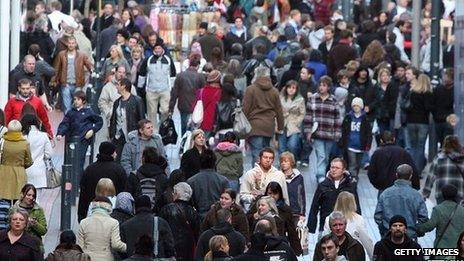Can business lead the recovery?
- Published
- comments
.jpg)
The government has promised to guarantee mortgages using taxpayers' cash
Economic recoveries led by private-sector investment are few and far between.
Companies, for understandable reasons, tend to wait till they see a consistent pattern of rising demand from customers before they embark on ambitious plans to expand capacity and hire lots of new people.
Which is why the weakness of the UK's disproportionately large consumer economy and the eurozone - Britain's largest export market, if regarded as a homogeneous whole - has meant growth in business investment has been significantly lower since the crash of 2008 than the government hoped (or, more precisely, than its Office for Budget Responsibility forecast).
History shows that retail-spending recoveries tend to lead economic recoveries, not investment revivals (which lag economic revival).
That is the respectable motive for the Treasury's attempt to revive the housing market, with taxpayer guarantees promised in the budget for £130bn of mortgages, in the sense that precedent indicates it should revive housing-related spending by consumers - although there is controversy about the strength of a link between general retail spending and house-price rises.
The UK may have become too dependent in the boom years on retail expenditure that was in part fuelled by an unsustainable housing boom. And this flaw in the UK's economy may have been recognised by the chancellor and prime minister. But the government now takes the view - as shown by its actions - that a flawed, unbalanced recovery is better than no recovery.
And indeed it is striking that as George Osborne fends off criticism from the International Monetary Fund that he is not doing enough to steer the British economy from the doldrums, part of his defence appears to be that the IMF hasn't noticed the mortgage-guarantee scheme and the £12bn contingent liability the Treasury has said it will take on to protect banks from losses, should financially overstretched homeowners fail to repay their mortgages.

Firms are unlikely to expand until the High Street recovers
Of course it is not certain that a mini housing boom, if it materialises (not certain) would revive retail spending in the supposedly desirable way: although households have been saving more since the crash, they remain burdened by near-record debts. Many want or need to rebuild the strength of their finances by spending less and, as today's Markit Household Finance Index shows, with wages stubbornly refusing to keep pace with inflation and benefit payments being constrained, most consumers feel poorer.
That said, there may be less squeezed times ahead, if the recent falls in oil and commodity prices are sustained.
But what about the Funding For Lending Scheme (FLS), whose extension for an extra year (to 2015) and to a wider range of borrowers will be announced in the coming days?
Will that supply a kick to the UK's stalled recovery?
Well most businesses would say that it can't do any harm, if it increases the availability of loans to small and medium size businesses and cuts the interest rate they pay.
And here's the thing: businesses in general continue to repay their existing debts to banks faster than they take out new loans, according to the latest Bank of England figures.
This reflects two trends, which you've read about here a boringly large number of times.
Banks won't lend to the riskier businesses that badly want and need to borrow, even with the benefit of cheap FLS money from the Bank of England, because the credit risk remains with the banks and is not taken by taxpayers.
And stronger businesses are not desperate to borrow, and on balance would rather repay their debts, in the absence of a growing market for their goods and services.
So unless and until the British High Street and the economies of Spain, Italy, Greece et al are tickety-boo again, it is somewhat unlikely that British businesses as a collective will be adding new production lines or expanding into gleaming new offices.
So does that mean George Osborne has no levers to pull?
Well, at the risk of boring you witless, I would point to the one marked "infrastructure".
The government's critics argue that if private-sector enterprises can't or won't invest, he could and should do more on the Treasury's balance sheet. But the chancellor's riposte is that he is pulling the infrastructure lever as hard as those who lend to him will tolerate.
Or to put it another way, Mr Osborne sees the government as one of those riskier businesses whose access to affordable credit cannot be guaranteed, whereas others would wish him to be a tad more bold and (ahem) entrepreneurial.